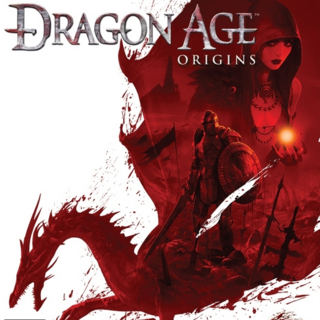Is it wrong to love a game this much?
The 'Origins' of Dragon Age, besides being a potential setup title for sequels, are the six vastly different origin stories that begin once you've rolled your main character. Unlike most games which take place after a series of events have happened to bring any character to the game's beginning, Dragon Age includes roughly an hour of gameplay before the events of the larger story begin. The interesting consequences of this is that a character from your origin story may turn up further down the storyline and although you may see them if you had a different origin story, their reactions to you would be quite different.
Consequence is one major component of Dragon Age, unlike most games with black and white choices such as: Help old lady cross a street or drown some puppies, the moral choices here have many varying shades or grey or challenge duty over loyalty. Some decisions go far deeper than others and may effect the survival of an entire race or may simply effect which of your companions you may end up in a relationship with. To a large degree these choices are superficial as your route through the main story will undoubtedly end up mostly the same regardless of whether you feel that little Timmy should live or die, except that Dragon Age makes you feel as though you have found your own way to get there and does it with far greater diversity than any other game that comes to mind.
Much like in Mass Effect you'll be taking a diverse trio of companions along with you on your missions, each with their own backstory, unique mission and opinion on your actions as they jabber backwards and forward between themselves. Should you purchase a new copy of Dragon Age you'll get a download code for the tenth companion: Shale, who comes across as a stone version of the metal HK-47 from KotOR who has a pulsing hatred for squishies (meat bags) and epically birds. There is a benefit of building up a relationship with these characters as new combat bonuses will unlock once they warm up to you, such as increased spell power or you could convince them to train you or one of your other companions in one of their combat skills. During combat these companions can be 'programed' to perform specific actions along the lines of: If you are shot at with arrows then use an ability and cast a spell on the attacker. These commands sound complex but there are some default templates for character types, with a little tweaking these templates can make a difference from defeat to victory.
Combat can be approached in many ways: a mass effect style over the shoulder view or a traditional overhead view; whichever view you choose combat is rarely something you can hastily run into and expect to become victorious. Having a good selection of characters available is crucial, having a mage to inflict area damage while the warrior charges in is one of the more basic strategies, but with the combination of spells things can become a little complex. Should you enter a room full of targets your mage could cover the floor in oil, buying you time while your foes to slip and fall to the ground as your archer takes out the distant targets, then a fireball into the oil will ignite it and scatter anyone nearby, then cast an icy blizzard, extinguishing the flames and freezing everyone in the room except your warrior who is holding equipment that protects him from cold damage.
If you plan on playing through anything but the easiest difficulty then having a strategy is a must, Dragon Age can be very tough. Some side quests can be especially difficult which makes frequent savings important as you may have to revisit an area once you've leveled up a few times. An interesting choice here is the lack of a hard level cap, instead there's only a finite number of battles to have and creatures to kill so you'll likely not progress any farther than the early twenties and there's no going back once your through with the story.
There's something special about the way that the story is told in Dragon Age and while many may dislike the rather old idea of a silent protagonist the story and lore behind the world cannot be overstated. From the castleless Dwarves of Orzammar to the mages tower on the lake each area has its story to tell and it's a story that's so deep that by the end of the 50 plus hour story you'll be feeling as if you've known the world forever. Throughout the story your character remains mute, although all other dialog is both well written and spoken. However, the world is generally a serious place with just some moments where your companions may try to make light of the gloomy situation around them, but nothing about the dialog felt as jarringly out of place as a dwarf using the words "Epic Fail". Otherwise the audio is great and the music is the typically powerful orchestral affair that is interchangeable between just about any game of this type. Graphically Dragon Age looks great however you may experience some frame rate problems at some points in the game, however as is the way with PCs, this might be the exception rather than the norm depending on your setup and the alignment of the stars.
Anyone who enjoys a solid medieval RPG and has roughly fifty hours to spare would truly be doing themselves a huge disservice by not picking up a copy of Dragon Age. The combat feel deliciously classic and the choices along with the story raise the bar for this generation of role playing games.
Mark Dell
Originally posted to CitizenGame.co.uk on Nov 25, 2009

